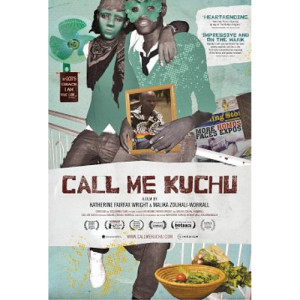
‘Call Me Kuchu’
The struggle continues
by Megan Smith
Russia’s recent antigay law banning the “propaganda of nontraditional sexual relations to minors” has the international community up in arms. Celebrities are boycotting the upcoming Winter Olympics in Sochi. LGBT bar owners are pouring their Russian vodka into the streets.
 But with time, headlines fade—even when conflicts are not resolved. Call Me Kuchu reminds us not to forget those headlines—especially when they read, “Kill-the-Gays Bill Proposed in Uganda.”
But with time, headlines fade—even when conflicts are not resolved. Call Me Kuchu reminds us not to forget those headlines—especially when they read, “Kill-the-Gays Bill Proposed in Uganda.”
Directed by filmmakers Katherine Fairfax Wright and Malika Zouhali-Worrall, Call Me Kuchu follows the life of David Kato, Uganda’s first openly gay man, and his small band of “kuchus,” a local term for “queers.”
This is not your average activist documentary. Kato and his followers are living in a country where homosexuality is illegal and punishable by incarceration for up to fourteen years.
Merely existing is a constant battle, as locals seem fixated on eradicating homosexuality from the country. The local tabloid publishes pictures of any LGBT-identified person with headlines reading, “Hang Them,” to feed the public’s obsession with hatred. When interviewed for this film, the newspaper’s editor showed no remorse.
The intimate stories told by Kato and his followers reveal just how deep the horrors for LGBT people in Uganda run. We meet Stosh, a trans-man who suffered through a “corrective” rape after a man caught him fooling around with a young woman when he was still a teenage girl. This same man infected him with HIV.
Then there’s Naome, a feminine lesbian with two children she provides for after leaving a loveless heterosexual marriage so she could be honest about her sexuality.
And of course there’s Kato, a teacher and activist who, despite his strong will and leadership, is constantly scared to sleep alone in his bedroom for fear of being murdered in the night.
Overcoming hardship, they find strength and hope in community. It’s all laughs and smiles during anniversary parties and household drag balls, held out of sight in the privacy of their homes.
Outside those walls, smiles are scarce. American evangelical leaders, who no longer get much support for their antigay message at home, have found new believers in Uganda. Ridding this nation of homosexuality will return the country to prosperity, they say. Ugandans must take action against “sodomites” who “corrupt” and “recruit” their children.
This message resonated with Ugandan parliament member David Bahati. In late 2009, he submitted the Anti-Homosexuality Bill, often known as the “Kill the Gays” bill. The bill prescribes life imprisonment for “the offense of homosexuality” and the death penalty for “aggravated homosexuality.”
Kato fought hard against this bill until January 2011, when a man he had previously been kind to bludgeoned him to death with a hammer. Kato was forty-six.
Although this tragedy shocked both the filmmakers and Kato’s friends, his death was not in vain. The murder sparked international condemnation, and his killer was ultimately captured. The anti-homosexuality bill was also tabled shortly after Kato’s death, but it has since been revived.
Kato’s band of followers vows to never give up the fight. Until this bill is killed once and for all, a luta continua—the struggle continues.
From Cinedigm Entertainment (newvideo.com).










